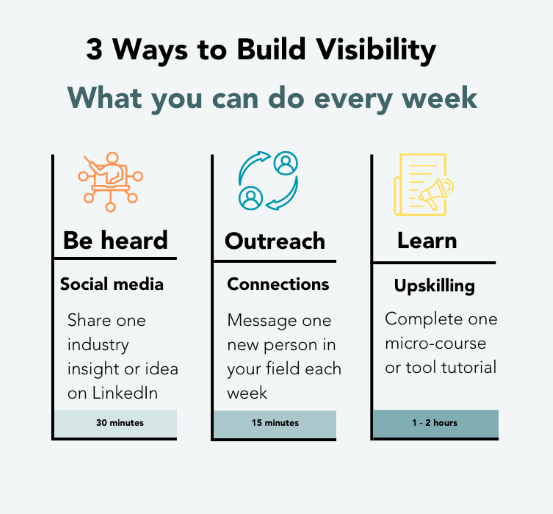Skills Hub
By Georgia Smith

Starting your career should be an exciting prospect. After years of studying and envisioning a bright career path, it's natural to feel eager to make a meaningful impact in the working world.
But sometimes, this enthusiasm can be dampened by a shadow. This shadow might look like a job market that feels stagnant, encountering a workplace culture plagued by burnout, or facing a growing gap between what education provides and what employers demand.
Recently, this has been highlighted by the World Economic Forum, which says;
“50 million young people worldwide are economically disengaged due to a lack of adequate skills to succeed in the labour market.”
So, how can you make sure to stand out in a tenuous employment market?
Whether you're looking to land your first role or grow within your current one, this article will explore how to launch your career with confidence and make an impact, either as a sharp researcher, a driven analyst, or anything in between. Below, we cover 3 tips for your job search and 4 tips that cover the best ways to stand out to your current employer while avoiding burnout.
Why Burnout Isn't a Badge of Honour
Firstly, let’s clear this up: exhaustion doesn’t equal excellence.
In many ways, modern work culture has long glorified burnout. It’s been dressed up in trends like the “rise and grind” mentality, the myth of the tireless entrepreneur, or the hustle of your 5-to-9 after the 9-to-5.
But what does it look like in reality?
According to Gallup’s global workplace data, over 40% of employees experience daily stress, and younger workers, especially early-career professionals, report the highest rates. Burnout isn’t just a personal health issue; it directly undermines your performance.
Harvard Business Review found that workers who describe themselves as “thriving” outperform others by 16%, and they’re significantly more likely to stick around.
So if you think working to excess and burning out is your ticket to the top, you might need to rethink your strategy.
It is possible to excel without sacrificing your mental health in the process - we look at how below!
3 Ways To Get Your CV Noticed
When you’re not yet in a role, whether you’re applying, interviewing, or navigating a gap between jobs, the temptation is to do everything. You think: “If I just hustle hard enough, someone will notice.”
But smart visibility isn’t about doing more, it’s about showing you know how to work well, grow fast, and stay sane. We’ll look at how to:
Understand the skills you need.
Show, don’t tell your skills.
Visibility without 24/7 pressure.
Set boundaries during your search.
1. Understand the skills you need
You’ve studied and now you’re ready to enter the workforce, ideally in a career that aligns with your degree, your aspirations, and one that you believe is ultimately fulfilling.
However, there's an increasing gap between the requirements for entry-level roles and the skill sets of many graduates.
Don’t panic - this isn’t a problem that reflects on your abilities. But it is something to keep in mind as you transition into the professional world, especially if you want to present yourself as a well-prepared candidate.
Every hiring manager has different priorities depending on the industry and role, but most will be assessing a mix of:
Academic qualifications
Critical thinking
Technical expertise (e.g. AI)
Soft skills(e.g. Clear communication skills, eager to learn, open to feedback)
A recent Freshminds Poll showed that evidence of critical thinking carried by far the most weight amongst hiring managers interested in finding the future stars for their businesses.
Reflect on both the technical and soft skills that may need strengthening. You don’t need to know everything from the start, but demonstrating problem-solving abilities, creativity, lateral thinking and a genuine interest in growth and learning can set you apart.
2. Show, don’t tell your skills
It’s always good to understand what requirements your ideal role looks for - if you don’t, it’s a good idea to investigate!
Instead of waiting for a company to give you permission, build something that shows your value and these skills. These personal projects demonstrate real skills in a way employers understand. For example:
Analyst? Build a dashboard using public data.
Researcher? Summarise a white paper on a critical topic in your field.
Consultant? Write a 3-slide teardown of a company’s product strategy.
Here’s a tip! Publish it (on LinkedIn, a blog, GitHub, or Medium). Great content gets shared, and shared work gets you noticed.
3. Build visibility without exhaustion
In 2025, social media is important. But equally, you don’t need to post on social media daily or attend five webinars a week. Instead, focus on lightweight, repeatable actions. This could look something like this:

Even 3 - 5 hours per week can dramatically raise your profile, without burning out. And don’t forget, quality posting and engagement with others is always better than quantity.
4. Set boundaries early, even in job hunting
Yes, job searching is urgent. But it's a marathon, not a sprint.
Block breaks into your schedule, even 30 minutes of unplugged time helps.
Avoid applying to 30 jobs in one sitting. Batch and track your outreach.
Don’t confuse urgency with value. Show you’re thoughtful, not desperate.
Employers can smell burnout, and it doesn’t feel or look good.
What you don’t want is to start a role when you’re already mentally burnt out, it means you won’t give off the best impression, you won’t have the enthusiasm to impress, and it’s possible you’ll make what should be a positive step in the right career direction feel like a drain.

4 Tips For How to Get Noticed At Work
Once you're hired, the pressure often shifts. You're in the door, now you want to prove you deserve to stay and rise fast! Here's how to stand out without wrecking your health or happiness.
Prioritise usefulness over hours.
Protect your energy.
Make visibility a habit, not a performance.
Ask for feedback often and use it.
1. Prioritise usefulness over hours
Effort doesn’t always equate to impact. According to a study by Harvard Business Review, 41% of employees think being seen at their desk late helps their career, but managers consistently rate results and resourcefulness higher than raw time logged.
Your goal? Become someone the team depends on, for clarity, speed, and quality.
Practical ways to do this:
Track your team’s pain points, what slows them down? If it’s reporting, maybe you can learn how to automate dashboards. If it’s onboarding, create a cheat sheet or guide.
Build the skills the team values. If everyone’s learning Notion, Tableau, or AI tools, lean in early and share what you find.
Create reusable assets. Templates, how-to documents, or simple workflows that help others save time will make your impact visible beyond your immediate tasks.
Here’s a tip: People may not remember every project, but they’ll remember the person who made their job easier.
2. Protect your energy
High performers manage energy, not just time.
Working longer isn’t the same as working better. Peak performance requires recovery, rhythm, and awareness of your personal limits.
One effective strategy is to work in focused bursts rather than grinding through long, unfocused stretches. Techniques like the Pomodoro method, which alternates 25 minutes of deep focus with 5-minute breaks, can help maximise mental stamina.
Similarly, time blocking allows you to dedicate uninterrupted periods to your most demanding tasks. It also helps to schedule your most challenging work during your peak mental hours. For example, if you're a morning person, protect those early hours for deep work; if you're sharper later in the day, structure your schedule accordingly.
“For entry-level professionals, taking care of your mental health first enables you to fully support your team. This is how you begin earning the confidence of senior leaders early in your career.” Freshminds Consultant
Most importantly, don’t compromise on sleep.
Sacrificing rest in the name of productivity often leads to poor returns.
3. Make visibility a habit, not a performance
Being seen doesn’t have to mean showing off. In fact, regular low-key visibility builds more trust than occasional big displays.
Here’s a simple visibility rhythm you can adopt:
Weekly: Send a short update or “what I’m focusing on” message to your manager or team.
Bi-weekly: Share a small win or lesson learned in a meeting, just 1-2 minutes.
Monthly: Propose one improvement or raise a thoughtful question in a team review or 1:1.
By staying visible consistently, you remove the need to “perform” under pressure. Over time, this creates a reputation for being reliable and proactive.
4. Ask for feedback often and act on it
Feedback doesn’t have to be scary or formal. It’s one of the fastest ways to grow and to signal that you want to grow.
Not sure where to start? For example, you could use a feedback prompt like:
“I’m working on growing in [e.g., leadership, communication, decision-making]. Do you have any tips?”
This habit shows two crucial things:
Coachability: A top trait managers look for in future leaders.
Initiative: You’re not just reactive, you’re evolving.
Embracing feedback isn’t just about improvement; it’s about your mindset. When you actively seek it out and take action, you set yourself apart as someone who’s committed to growing - businesses like that!